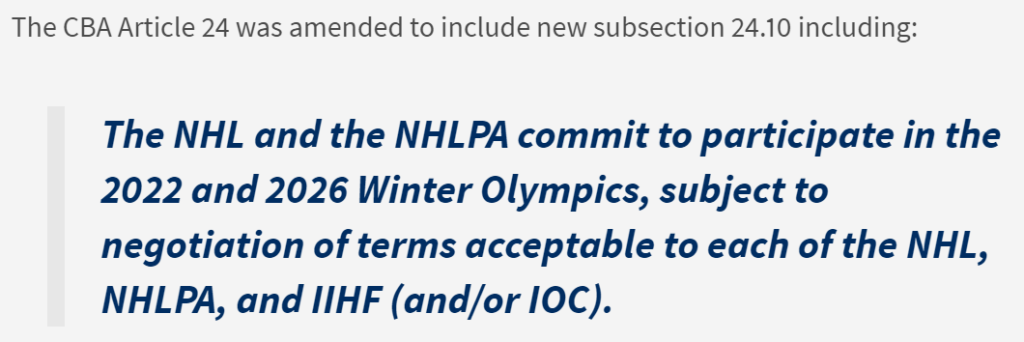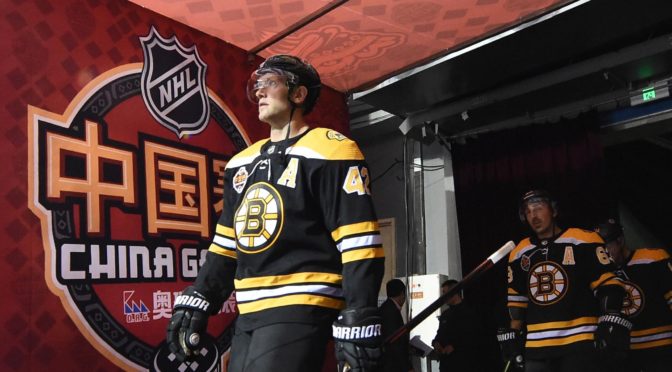Weekly Roundup
- Six potential scenarios for Chinese ice hockey ahead of the 2022 Beijing Olympics
- Latest news on whether NHL players will return to Olympics
- Pfizer competes with Chinese vaccines at Tokyo and Beijing Games
- Boycott Watch
- Other stories in the build-up to Beijing 2022
Can the Car Crash Be Avoided?
Thanks to all of you who got in touch after last week’s story about the current state of Chinese ice hockey and the car crash that appears to lie in wait at the 2022 Beijing Olympics. I heard from multiple players, coaches, industry execs and journalists, who all reached out to offer some thoughts. It also resulted in at least one follow-up story, with The Economist – of all people – highlighting the situation.
What is certain is that there are sure to be many more twists and turns in the tale over the next few months. Last week, I offered two options as to what might happen – that either the International Ice Hockey federation (IIHF) kicks China out of the tournament or that China quickly naturalizes some foreign recruits and does the best it can.
But I’d like to lay out a slightly more nuanced set of options for the road ahead:
- The IIHF expels China from the men’s tournament, by withdrawing their automatic berth. [EXPULSION]
- China gracefully withdraws from the men’s tournament, saying that time was, in fact, too short, but they’ll be ready for 2026 and beyond. [GRACEFUL EXIT]
- The IIHF rejigs the men’s tournament in line with the women’s version, so that the groups are seeded. If China is placed in Group C, they could play (as-yet-undetermined) qualifiers such as Slovakia, Latvia and Norway – teams that would still wipe the floor with China, but aren’t the US or Canada. [REALIGNMENT]
- China naturalizes some of the “heritage” players (North Americans of Chinese decent), who have been associated with Kunlun Red Star. [HERITAGE RECRUITS]
- China naturalizes some other foreigners, likely from Russia, old Soviet countries or even elsewhere. [FOREIGN RECRUITS]
- China sticks with its current Olympic squad in Shenyang and hopes for the best. [HEAD IN THE SAND]
It seems clear that #2 (graceful exit) would be the best course of action for all concerned. The level of Chinese ice hockey, in its current form, simply isn’t anywhere near good enough and those close to the sport all know it, even if the bureaucrats refuse to either see or admit it. But I don’t see either #1 (expulsion) or #2 (graceful exit) happening, because I don’t think things will get that far.
Some combination of #4 (naturalizing the heritage players), which The Economist highlights as the “only realistic solution” or #5 (naturalizing other foreigners) looks most likely at the moment, and if China can also convince the IIHF to carry out #3 (re-seeding the tournament groups) as well, then the scores next February would become more respectable – even if Chinese ice hockey victories would still lie beyond the realm of reality.
Will NHL Players Actually Return?
One major unknown remains the participation of NHL players at the Beijing Olympics. The vast majority of hockey fans around the world want to see the NHL players back in the Olympics, but this is highly relevant to the discussion of the fortunes of the Chinese ice hockey team. If NHL players are not there in Beijing, then the talent differential between the Chinese ice hockey team and its opponents shrinks dramatically and the spotlight on the whole situation will be far less bright. The Chinese side shouldn’t be putting too many eggs in this particular basket, but it does provide an additional route towards avoiding the car crash’s biggest impact.
Most of the hockey world has been under the assumption that NHL players will return to the Olympics in 2022 after sitting out 2018 in Pyeongchang. That assumption has grown in recent weeks, as national teams have started to announce their management and coaching teams. But one NHL exec told me this week that the question of whether NHL players travel to Beijing is still a “big if”, with “lots of details to finalize” – not exactly the fait accompli many have assumed. As always, it’s going to come down to $$ and who will pick up the associated costs.

NHL Deputy Commissioner Bill Daly told The Athletic’s Pierre LeBrun and Scott Burnside that the NHL would “need to know sometime this month [i.e. May] on where things stand on Olympic participation for Beijing”, although I understand that the league’s actual deadline is in fact the end of June, not May. Discussions between the various parties – the NHL, the NHL Players’ Association (NHLPA), the IOC and the IIHF – are ongoing, with the World Championships in Latvia from May 21-June 6 likely a key time to hammer out the details.
Here’s more from Daly:
I would also say that it would be naive to think that the IOC or the Olympic worlds revolve around us; they don’t. They’ve got a lot going on. They’ve got Summer Games to put on in a couple of months. Having the Beijing Games so soon after the Tokyo Games I would imagine is a challenge on many levels.
He’s got a point. The NHL issue is pretty significant when it comes to Beijing 2022, but it needs to be resolved before Tokyo Olympics take place in July, and there won’t be a huge amount of bandwidth from the IOC to do that.
The other big concern here, of course, is NHL Commissioner Gary Bettman, possibly the most notorious negotiator in the entire sports world, who has presided over three NHL lock outs. He’d lock his own grandmother out of the house in the middle of winter if it meant getting an extra dollar for his owners, so nothing is done until it’s done. Watch this space…
Pfizer Move Dismissed as “PR Gesture”
Last week, the IOC announced that Pfizer and BioNTech had agreed to donate doses of the companies’ COVID-19 vaccine to participants of the Tokyo Olympics from around the world. However, this would have to be rolled out extremely quickly, and only in places where the vaccine has already been approved (currently 91 countries and territories worldwide). 11,000 Olympic and 4,400 Paralympic athletes from more than 200 countries are expected to compete in Tokyo.
Given the late timing, Pfizer’s move was a called “a PR gesture and very little more” by Lawrence Gostin, the director of the World Health Organization’s center on global health law. But it was interesting that Pfizer donated the doses, rather than the previous offer from China to supply Chinese vaccines to athletes going to both the Tokyo and Beijing Olympics, for which the IOC is picking up the tab.
The IOC has said it is encouraging – but not mandating – vaccinations for Olympic participants in Tokyo. There is no word yet on the policy for Beijing, either from the IOC or from the Chinese side. See also: Chinese President Xi and IOC President Bach speak about Beijing 2022 during call [insidethegames]
Boycott Watch
We’re really scraping the barrel in this section today. Given the current COVID-19 situation in Japan, there are actually more headlines about scrapping the Tokyo Olympics than the Beijing Olympics at the moment. For example, here’s “political scientist” Jules Boykoff in the New York Times arguing “A Sports Event Shouldn’t Be a Superspreader. Cancel the Olympics.” Always check the source, though: the author is presented as a COVID expert, but has written a book called “NOlympians”, so he was never likely to say “Bring on the Games?” even without a pandemic.
Next up, the FT tells us that “Olympics sponsors duck questions over Beijing 2022 as boycott calls grow“, quoting spokespeople from Human Rights Watch, World Uyghur Congress and International Tibet Network, as well as the head of the Tibetan government in exile. Can you see where this is going? “Multinational companies sponsoring the 2022 Beijing Winter Olympic Games are evading questions about their participation as China comes under intense pressure over the repression of Uyghurs in Xinjiang,” starts the piece. But we’ve known all that for weeks, just as we know that the companies are basically not going to address the issue in any meaningful way, given that any statement would either alienate one market (China) or the other (global). Can we come up with something new, please?
Six reporters – none of whom are on the Chinese mainland – contributed to that FT article and you have to say there’s a growing case that China’s expulsion of foreign journalists in recent years is backfiring on the Chinese government, given that it is resulting in increasingly hostile coverage. Take this piece, for instance – Is Beijing Planning a Rob, Replicate, Replace Olympics? – which is, hands down, the most ludicrous Olympic-related piece I’ve read all year. Think tank author Cleo Paskal actually tries to make the case that China will try to sequence genetic material obtained from the COVID tests of international Olympic athletes coming into China in a bid to create super Olympians to win gold for China. Seriously, who commissions – and greenlights – this stuff? But I suppose that’s what fills the void of China coverage when most of the actual reporters have been kicked out.
See also: Corporations should think twice before sponsoring the ‘Genocide Olympics’ [Washington Post], US warns China will use Olympics to gloss over abuses [AFP]
Other Stories and Links
- Skiing legend Vonn backs athlete protests but not on Olympic podium [insidethegames]
- Chinese swimmer Sun Yang handed Tokyo Olympics lifeline [AFP]
- Beijing pollution is a hot potato for the winter Olympics [Bloomberg]
- Naturalized Zheng Ninali (aka Nina Schultze) aiming to fulfil family Olympic dream [Xinhua]
- Troy Ryan set to coach Canadian women’s hockey team at Beijing Olympics [CBC]
See also:
- Frostbitten: China Facing Olympic Ice Hockey Expulsion
- 40 Weeks To Go: Cotton Socks, Robotaxis & Tchaikovsky
- 41 Weeks To Go: Boycott Bill & Olympic Protests Outlawed
- 300 Days To Go: BioNTech Vaccine in China & Boycott Threats Ease
- 43 Weeks To Go: Ping Pong Diplomacy & Canadian’s Chinese Dream
To keep up-to-date with all the latest news from China Sports Insider, please click on the “SUBSCRIBE” button in the top right corner of this page (or see below on mobile version or click here from email version). Also follow along on Twitter for regular updates.


